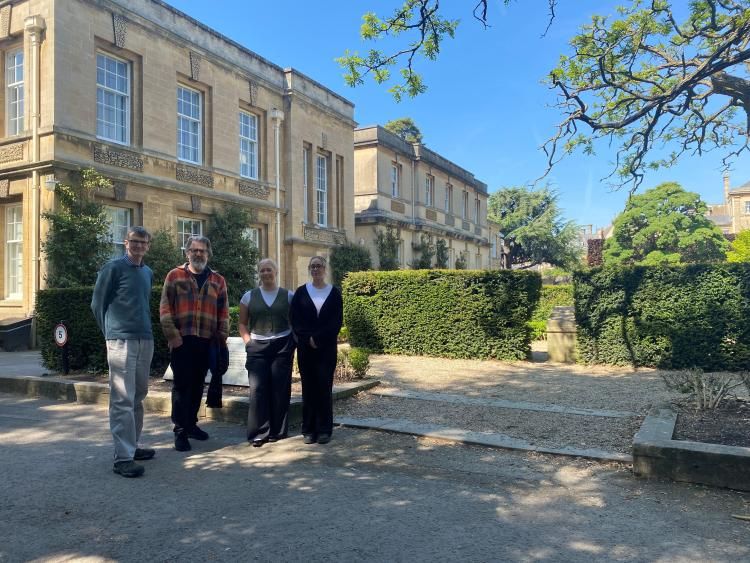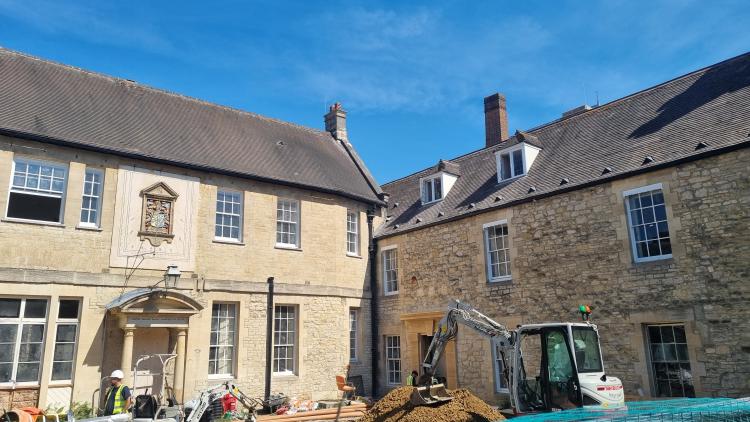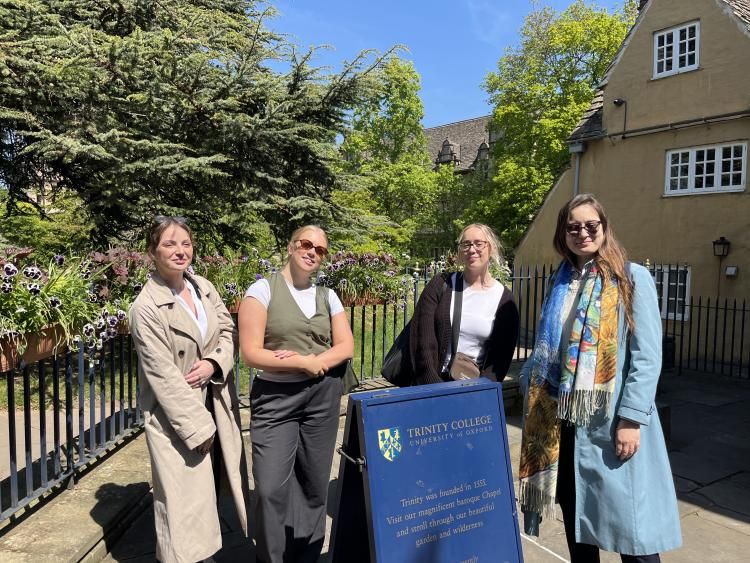Historic Oxford college buildings celebrate energy efficiency progress
Inspirational university teams talk us through their vision for net zero
Some of Oxford’s most historic and complex buildings are set for innovative energy efficiency measures, thanks to the Public Sector Decarbonisation Scheme.
Magdalen College, Brasenose College and Trinity College are three sites which have successfully won funding under the scheme run by the Department for Energy Security and Net Zero and delivered by our teams at Salix.
Energy experts at each college site met with our colleagues as they are currently engaged in energy efficiency works on their buildings in a bid to reduce carbon emissions.
Each college site reflects different stages of their Public Sector Decarbonisation Scheme journey. Whilst Magdalen College is just starting and Brasenose College is established, Trinity College is about to finish this stage of development.
Our client support officer Claudia Head visited the colleges to see for herself how the buildings will be transformed into more efficient sites fit for the future.
She said: “Each site has incredibly unique issues and a huge amount of careful planning is taking place before works begin. It’s a fascinating time to visit giving us a chance to discuss the vision and see for ourselves how the buildings will be impacted.
“Like all Public Sector Decarbonisation Scheme projects, a huge amount of work is applied at the applications stage, and they have faced huge scrutiny. It is so satisfying to come along at this point and see how that vision will be applied.”
Magdalen College, situated on the outskirts of the city, has been awarded £166k under the Phase 3c of the Public Sector Decarbonisation Scheme for its project.
The college buildings at Cowley House, Old School House and Longwall Cottage are used for accommodation. The funds will pay to install air source heat pumps and radiator replacements which are expected to be installed later this summer.

Our Salix team members Molly Evanson and Claudia Head meet Bill Watts from Max Fordham and Andrew Dawson from Original Field of Architecture at Magdalen College. Both Bill and Andrew have been involved in developing the project for the university.
Photo credit: Salix Finance
Claudia added: “There are a number of challenges here including working around the student timetable, also there are summer programmes here which adds to the pressure.
“Of course, at colleges like these it is key to consider carefully the aesthetic.”
During the visit Claudia and colleague Molly Evanson met director, Andrew Dawson, director at original field of architecture, Tim Dowdeswell, head of maintenance at Magdalen College and Bill Watts, partner at Max Fordham consultancy.
They also discussed the project with college surveyor Robert Langley.
Robert said: "At Magdalen we have found that decarbonising historic buildings is a delicate balancing act - preserving the past while preparing for a sustainable future.
"The project team have come up with some innovative ideas and solutions and I look forward to realising those during the implementation stage this summer.”
The team got a chance to visit Brasenose College located in the densely built heart of Oxford bringing special challenges of access for the rig drilling equipment.
Adding to the logistical complications the building is situated near archaeological excavations in the area which have uncovered evidence of Iron Age activity.

Brasenose undergoing works as part of the Public Sector Decarbonisation Scheme
Photo credit: Salix Finance
This project is a massive retrofit project for a historical building that is going to be student accommodations. The energy efficiency measures will transform the building setting it up for a positive future.
Salix client support officer Anna Kuratnikova has been working closely with the college to ensure the vision shapes up. She met with Kris Sadler, domestic bursar, David Behan, Etch Associates, Paul Willats, Frewin site manager and Phil Parker, bursar.
Anna said: “This project is a massive retrofit project for a historical building that is going to be student accommodations. The energy efficiency measures will transform the building setting it up for a positive future.”
The Public Sector Decarbonisation Scheme is funding the ground source heat pump, secondary glazing, loft, walls, floor insulation and mechanical ventilation and heat recovery systems.
Whilst the total grant is £349k, the overall retrofit project is significantly higher and funded through other sources.
The team also met the people driving the net zero project at Trinity College, also part of the University of Oxford.
Salix programme co-ordinator Evelyn West said: “This is a fascinating site that has used the Low Carbon Skills Fund to draw up a heat decarbonisation plan and two rounds of the Public Sector Decarbonisation Scheme to help fund capital works.”
Phase 3b of the Public Sector Decarbonisation Scheme was used to fund a ground source heat pump project at the listed Jackson building and Phase 3c funding to help fund an air source heat pump for offsite accommodation.
Evelyn added: “The key thing for both Brasenose and Trinity is the way in which they have managed to conduct these projects in extremely hard to decarbonise buildings with sensitivity to the heritage status and historical importance to the buildings.
“Brasenose was particularly impressive in terms of the sophistication of the energy efficiency measures in such an old building, working very closely with English Heritage.
“The general theme being that if you can decarbonise these buildings, you can decarbonise anything!”

The Salix team pictured from left: Eliza Loftus, Molly Evanson, Claudia Head and Anna Kuratnikova during their visit to Trinity College, University of Oxford
Photo credit: Salix Finance
Estates bursar at Trinity College Chris Ferguson said the college was delighted with resulting Public Sector Decarbonisation Scheme work.
He added: “Our Public Sector Decarbonisation Scheme Phase 3c air source heat pump project in a modern building about a mile north of the centre of town was relatively straightforward.
“However, the Phase 3b ground source project to decarbonise a Grade II listed building at the heart of our campus was much more complicated.
“To provide sufficient heat our boreholes go down 170m, and the connecting pipework involved horizontal drilling to avoid the root protection zones for our magnificent trees.
“Meanwhile, the building itself required significant fabric improvements, including secondary glazing throughout.
“But we were lucky to have a very good team, so the works were carefully planned and in fact ran smoothly.
“We are absolutely delighted with the results. When we switched over from the old gas boilers to the new heat pumps during bitter weather in mid-February the occupants of the building did not notice the change!
“We are very grateful to Evelyn and the whole Salix team for their considerate and helpful support throughout both projects.”
Thank you to everyone at Trinity, Brasenose and Magdalen for hosting our Salix team and providing such valuable insight and sharing your vision for a net zero future.




